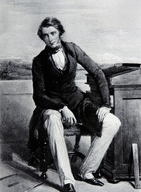John Ruskin (1819-1900)

John Ruskin (8 February 1819 – 20 January 1900) was a polymath. As a writer, he commanded international respect. He was an art critic and an art patron, a skilled draughtsman and talented watercolourist, and a fierce critic of prevailing social and political norms.
He wrote about nature and architecture, craftsmanship, geology, botany, Greek myth, education—a dizzying variety of subjects. Driven by his deep faith in social justice, he established the Guild of St George in the 1870s to right some of the social wrongs of the day and make England a happier and more beautiful place in which to live and work. He gave the Guild a substantial art collection for the benefit and education of the working people of Sheffield, where it thrives to this day.
Distinguished Ruskinian and Companion of the Guild, Professor Dinah Birch, has kindly shared a paper she delivered at Ruskin Land in April 2024, that focuses on the interdisciplinarity of Ruskin’s work, and how the underlying principles of his social engagement align with contemporary thought. It is a very useful and succinct introduction to Ruskin, and you can read it HERE.
From the extraordinary range of his writing and thought, four ideas have particular relevance to the Guild of St George:
No Wealth but Life
Ruskin abhorred the bad business practices that made the rich richer yet condemned ordinary people to drudgery. He hated the way mechanised industry was eating up the countryside and blighting the natural landscape and deplored the factories for crowding the cities and belching out acrid smoke that polluted the air and choked people going about their everyday lives.
Ruskin’s mission, and his Guild’s purpose, was to make Britain a better place to live in. He wanted everyone to see and enjoy the unspoiled, inspirational beauty of the world, both in nature and in art.
“There is no wealth but life. Life, including all its powers of love, of joy, and of admiration. That country is the richest which nourishes the greatest number of noble and happy human beings; that man is richest who, having perfected the functions of his own life to the utmost, has also the widest helpful influence, both personal, and by means of his possessions, over the lives of others.”
UNTO THIS LAST
The Rural Economy
Ruskin argued that work should be creative, fulfilling and rewarding. He was a critic of crude economic ideas that devalued labour. He promoted the revival of rural industry and handcrafts, and inspired the formation of the arts and crafts movement.
“Life without industry is guilt, and industry without art is brutality.”
LECTURES ON ART
“We will try to take some small piece of English ground, beautiful, peaceful and fruitful. We will have no steam-engines upon it, and no railroads; we will have no untended or unthought-of creatures on it; none wretched, but the sick; none idle, but the dead.”
FORS CLAVIGERA
Not for present use alone
Ruskin was inspired by old buildings and believed we should make beautiful things that will last. He was one of the first conservationists and a guiding light for the founders of the National Trust and the Society for the Protection of Ancient Buildings.
“When we build, let us think that we build forever. Let it not be for present delight nor for present use alone. Let it be such work as our descendants will thank us for; and let us think, as we lay stone on stone, that a time is to come when those stones will be held sacred because our hands have touched them, and that men will say, as they look upon the labour and wrought substance of them, “See! This our father did for us.”
THE SEVEN LAMPS OF ARCHITECTURE
Go to Nature…
For Ruskin, the natural world was the primary source of beauty, inspiration and education, and the foundation for artistic practice. He believed in ‘truth to nature’ and supported J.M.W. Turner and the Pre-Raphaelites whose art was based on close observation of nature.
“… go to nature in all singleness of heart, and walk with her laboriously and trustingly, having no other thoughts but how best to penetrate her meaning, and remember her instruction; rejecting nothing, selecting nothing, and scorning nothing; believing all things to be right and good, and rejoicing always in the truth.”
MODERN PAINTERS VOL.1
Read more about Ruskin
Read more about Ruskin here, in the Wikipedia article on Ruskin, written and maintained by distinguished Ruskin scholar Dr Stuart Eagles.
